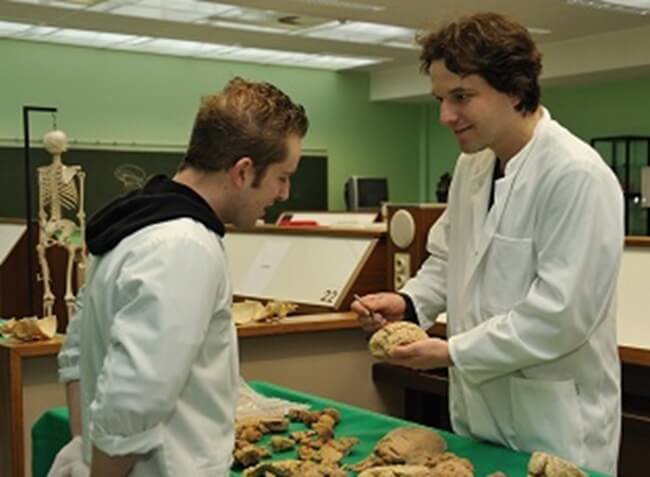How to become a professor? A 10-step career guide!
Being a professor is amazing: a lot of academic freedom to investigate and teach exciting subjects and a secure salary until retirement. However, obtaining this position can be pretty strenuous, and many young scientists do not know the requirements to qualify for such a position. In this article, I give you 10 essential parameters a selection committee will evaluate when selecting a new professor.
What is a professor?
A professor is an academic with a doctoral degree who holds the highest academic rank at a university or college.
Professors are experts in their field and are responsible for teaching undergraduate and graduate students, conducting research, and publishing their work in scholarly journals and books.
They also play a key role in the academic world by serving on committees, mentoring students, and participating in professional organizations.
They typically work for colleges and universities.
What is the difference between a college and a university?
While the term “university” is used similarly in most countries, the term “college” has many different meanings in different countries.
In the US, colleges provide undergraduate education and may span two or four years, awarding bachelor’s or associate degrees and certificates. Colleges can be public or private.
In contrast, a university is a four-year institution that offers both undergraduate and graduate degrees, including master’s and doctoral degrees. Universities are typically more research-intensive than colleges, and their professors are often expected to publish their research in scholarly journals and books.
On the other hand, universities offer both undergraduate and graduate degrees. Undergraduate programs typically last four years, while graduate programs, including master’s and doctoral programs, vary in duration. Read more here: How long does it take to complete a doctorate?
In other countries, these terms may be used differently – or not at all!
In the UK and Canada, for example, the term “college” typically refers to a secondary school that prepares students for university. These colleges may also offer vocational training programs.
In Ireland, “college” refers to secondary schools and third-level institutions (universities and institutes of technology).
In Australia and New Zealand, the term “college” is typically used to refer to a vocational training institution, such as a technical and further education (TAFE) college or a private college.
In some other countries, such as France and Germany, the term “college” is not used at all in the context of education.
It is important to note that the meaning of the term “college” can also vary within countries, depending on the specific institution or context. For example, in the UK, some universities also have colleges within them, such as the Colleges of Oxford and Cambridge.
In contrast to the variable use of the term “college” worldwide, there are not as many major differences in the use of the term “university.” In most countries, “university” refers to a higher education institution that offers undergraduate and graduate degrees and conducts original research.
What is the difference between a college professor and a university professor in the US?
In the United States, the terms “college professor” and “university professor” are often used interchangeably. However, there are some subtle differences between the two.
College professors work at community colleges or private colleges that typically offer undergraduate degrees and may offer associate’s degrees and certificates.
University professors work at universities that typically offer both undergraduate and graduate degrees, including master’s and doctoral degrees.
Universities generally are more research-intensive than colleges, and their professors are normally expected to publish their research in academic journals and books. How to become a university professor? Research experience is invaluable when applying for faculty positions.
Sometimes, “college professor” may refer to a professor who teaches at a smaller or less prestigious institution. However, there are many prestigious colleges in the US that have excellent faculty.
In comparison, “university professor” may refer to a professor who teaches at a larger or more prestigious institution. However, this is not always the case.
Here is a table summarizing the key differences between college professors and university professors:
| Characteristic | College Professor | University Professor |
| Primary teaching institution | College | University |
| Degrees offered | Undergraduate | Undergraduate and graduate (including master’s and doctoral degree) |
| Research expectations | Lower | Higher |
What is a professor in other countries of the world?
In most countries, the term “professor” typically refers to someone with the highest academic rank at a university or college. This is regardless of whether the institution primarily focuses on undergraduate or graduate education or public or private.
There are some exceptions to this general rule. For example, in the United Kingdom, “lecturer” often refers to junior faculty members, while “professor” is reserved for more senior faculty members.
Very rarely, instructors at technical schools or vocational schools are referred to as professors if they have an advanced degree in a specific field.
To add to the confusion, in some countries, such as France, the term “professor” is also used to refer to high school teachers.
However, in general, the term “professor” is used in most countries in a more inclusive way than in the U.S. All faculty members at a university or college, regardless of their teaching load or research opportunities, are typically considered professors.
Are all types of professors equal?
No, not all types of professors are equal. There are substantial differences in rank, reputation, and pay grade.
Rank: There are different ranks of professors in the Northern American academic system (assistant professor, associate professor, and full professor) and in the Commonwealth system (lecturer, senior lecturer, reader, professor)
Professors at different ranks have different levels of responsibility and reputation and are paid different salaries. See also my articles on the difference between assistant professors and associate professors and Readers.
Tenure: A tenured post or tenure-track position is an academic appointment until retirement. Thus, tenured professors have more job security and autonomy than other academic community members.
Salary: The median salary of postsecondary teachers generally increases from assistant professor to associate professor and finally to full professor. Data from the US Bureau of Labor Statistics indicates that the median annual salary of tenured professors is typically higher than that of their non-tenured counterparts.
Education: Tenured professors typically have a doctorate. However, part-time or adjunct professor roles are increasingly common in academia. These adjunct faculty positions often allow professionals to teach without a doctoral degree, though having a master’s degree is typically a minimum requirement.
Field of study: Professors in some fields, such as business and computer science, are typically paid more than professors in other fields, such as the humanities and social sciences.
Institution: Professors at prestigious institutions, such as Ivy League universities, are typically paid more and may have a higher reputation than professors at less prestigious institutions. Therefore, it makes sense to consider all arguments to apply for a professorship in a small or a big university.
Gender and race: According to several studies, women and minority professors are often paid less than white male professors, even when they have the same qualifications and experience.
In addition to these factors, there can be substantial differences among professors regarding teaching load, research expectations, and access to resources.
Thus, when you wonder, “how do I become a professor”, it makes sense to consider all these aspects to develop a strategy that fits with your goals, values and personality traits. The strategies for “how to become assistant professor?” and “how to become an adjunct professor” differ substantially.
Being a professor is amazing
What’s it like to be a college professor? The amazing aspects are teaching and doing research. You lead the next generation of students in your field and investigate the most exciting questions in your research area.
You publish your and your staff members’ research in scholarly articles and research papers. Later in your academic career, you may also exert leadership roles in your institution such as department head, dean, rector etc.
Apart from class time and research, there are more organizational or administrative tasks that are less appreciated by the professors. These include creating lesson plans, holding office hours, guiding the college admissions process, and participating in hiring committees.
No matter whether you are a neuroscience professor, a professor of psychology, or a professor of education, you have to participate in these often tedious tasks.
However, most of my colleagues love to be professors.
Are professors happy?
The happiness of professors hinges on a balance between the challenges and rewards of academia. They often derive joy from research, teaching, and influencing future generations, enjoying the autonomy and intellectual stimulation their roles provide. However, the journey to professorship is demanding, with the pressures of publishing, securing tenure, and managing a heavy workload.
Despite these hurdles, many find the fulfillment from scholarly achievements and student mentorship outweighs the stress. The key to a professor’s happiness lies in maintaining passion for their work amidst the competitive and demanding nature of academic life.
Steps to Becoming a Professor
If you want to teach and research at the college level, understanding the steps necessary to become a college professor or university professor is crucial. Before you start consider carefully whether it is worth it to become a professor!
If you’re wondering how to become a professor after obtaining an undergraduate degree, the first step is a doctorate and a postdoc in a related field. This is true for most academic positions, but there are some exceptions. For example, some tenured professors have been promoted through the ranks based on their teaching and research experience. Some colleges and universities hire adjunct professors who do not have a doctorate and work part-time.
During these qualification phases, you qualify yourself, learn necessary technical and transferable skills, and maybe broaden your horizon by working abroad.
The process of becoming a college professor doesn’t happen overnight. It is a long journey. From deciding on the subject you want to teach and research, to enrolling in a doctoral program and dedicating years of full-time study, the path to becoming a professor demands dedication.
After earning a doctorate, budding academics often look for jobs for quite a while. They may land a part-time position or assist a professor with research projects before securing tenure-track positions.
What qualifications, skills, and experiences do you need to become a professor?
You may wonder, how can I become a professor? Is it hard to become a professor? When considering a career path in higher education, many aspire to become a college or university professor without a clear plan of qualifying for such a position. How do you become a professor? With a strategy.
When you are prepared for a selection committee that evaluates your previous performances to decide whether you are qualified for a professorship you increase your chances dramatically.
Surprisingly, selection committees are often not impressed by strong grades, but require other qualifications. Below is a comprehensive list of the most critical parameters that determine the probability that you will be professor.
All ten parameters are essential when a selection committee selects a professor. At the same time, the list is also a guideline on the steps to becoming a college or university professor. You might also realize that you ask misleading questions such as: “how many publications do you need to become an assistant professor?” (see below). You can check whether you already qualify for a professorship.
A warning: These concepts are pretty subjective and derive primarily from experiences in Central Europe and may not apply in other parts of the world.
These parameters also apply mainly to the life sciences and related domains and may be less important in other fields. However, they may give you a first idea of what to expect when pursuing a career in academia. Finally, several colleagues mentioned that luck also plays a substantial role.
When you are interested in becoming a professor, before you start adapting your strategy, it is wise to analyze carefully whether you should become a professor – or not? Otherwise, you may invest a lot of time and energy to pursue a scientific career you do not really want.
10 PARAMETERS A SELECTION COMMITTEE WILL EVALUATE WHEN SELECTING A NEW PROFESSOR
1. PREVIOUS FUNDING
The best predictor for reaching the goal of becoming a professor is “the ability to raise money.”
This may surprise you because everybody will tell you your publication list is the most critical asset. This is wrong. It is a limited perspective.
When you successfully raise a lot of grant money, it will be easy to pay for many expensive consumables, invest in better instruments and technologies, and hire technicians, Ph.D. students, and postdocs to generate a lot of data for you. How to become a professor? By having a lot of ressources!
Just for the sake of completeness, let me add the following caveats:
- There is no guarantee that this money will be used efficiently.
- There is no guarantee that a lot of grant money produces great science and high-impact factor publications.
- There is no guarantee that raising a lot of grant money will lead to a professorship position.
However, to conduct research with just a few thousand Euros or Dollars per year will substantially limit your ‘chances to shine.’ Many professors experience this as the most unpleasant and most stressful part of science.
In the last century, raising industry money (paid by the industry to perform experiments in academia in joint projects or as a paid service) sometimes had a bad reputation in academia. Still, due to the economic development and shrinking budgets of funding institutions, industry money nowadays is seen as a backbone of most big labs.
A selection committee will expect that your previous performance is an excellent predictor of your future performance. Thus, having raised a lot of funding previously makes you a much more attractive candidate because this indicates that you have learned the necessary skills to write successful grant proposals.
Therefore, it is irrelevant how much money your supervisor has raised; your name should be on the application form – at least as a co-applicant. It is particularly attractive when you can transfer a nice and prestigious grant from your old to your new institution.
Caveat: Grant money usually cannot compensate for an insufficient publication list.
I wrote another article about getting more research funding that may interest you: Research funding – should I submit grant proposals under my supervisor’s name?
2. YOUR NICHE
Unsurprisingly, nearly all scientists become professors in the field where they worked the last 5 to 10 years and have shown expertise and high performance (e.g., high impact factors, patents, or industry collaborations).
Thus, the probability is high that your current research will determine in which field you will be a professor.
Defining your niche is therefore extremely important to stay healthy and enjoy your work in the following decades. Most scientists are in their field more or less by coincidence because they have chosen a particular PhD or postdoc project and stayed in this domain since then.
Therefore, choosing a niche consciously is a big advantage and may show your leadership skills. However, avoid a niche that is too small because this may limit your possibilities to get funding. You may also become too specialized, which can make it difficult to find a job.
Being an expert in a relevant niche can sometimes even compensate for a limited publication list or limited funding (for example, a highly trained expert in imaging or human anatomy).
3. FIRST AND LAST AUTHOR PUBLICATIONS
Apart from grant money and a well-selected niche, your publication list is the most critical parameter for pursuing a scientific academic career.
In life sciences and related domains, the impact factors of your first and last author publications are still the most important single parameter to judge your “scientific excellence.”
The h-index is not often used because it does not characterize the performance of early-stage scientists well, and it treats all papers equally, i.e., middle author and last author papers contribute equally). Read more here: Which bibliometric data are relevant for a research career?
There is a lot of debate about whether impact factors measure anything useful to define scientific quality, and there are multiple suggestions for alternative ranking systems. However, I am afraid there is still a long way to go before impact factors are replaced by better metrics.
You might gill me, “how many papers to become a professor?”, and I can not give you an informed answer because the *quantity* of papers is just one among many parameters. The quality (still measured by impact factors and h-index) is normally much more important. Thus, the question, “how many papers do you need to become a professor” is rather misleading.
In selection committees, impact factors and h-indices can be easily compared between candidates and strongly impact most institutions because a lot of intra- and extramural funding is still based on impact factors. To qualify for professorship positions, you must develop a conscious publication strategy.
Do you want more information on how to become a professor? Check out the online course “How to become a professor in science”.
Thus, what do you need to become a professor?
A publication list without publications above an impact factor of 5 doesn’t really stand a chance.
A list of 2 or more first-author publications with an impact factor above 10 (= “outstanding”), ideally generated in two different labs, dramatically increases your chances of becoming a professor.
Surprisingly, high-impact publications (such as Nature and Science) are not absolutely necessary to become a professor. Interestingly, in smaller or less prestigious research institutions a considerable number of professors have no publications with very high impact factors.
Be aware that being the corresponding author on a publication has typically no substantial influence on your career.
Thus, there is a limited chance to become a professor without Nature and Science papers. Read more here: Do I need Nature or Science papers for a successful career in science?
Read more here:
- What is the best publication strategy in science?
- How to increase the impact factor of your publications?
- Should I aim for multiple co-authorships to extend my publication list?
- Corresponding author versus senior author – what is the difference?
4. TEACHING
It is unclear whether teaching experiences are critical to becoming a professor. The experiences are mixed. There seems to be a tendency for smaller/regional universities to value teaching more than the bigger and more prestigious universities.
Anyway, teaching experience is a necessity because most professors spend a considerable part of their work time on teaching activities in bachelor’s, master’s, and graduate school programs and on supervising doctoral students.
Thus, participation in courses on didactics, online learning methods, or communication skills might be the logical next step to qualify yourself better to teach the next generation of students in your subject area. College professors gain teaching experience while doing their job. However, better be prepared.
It always helps to improve your communication skills; please read my article on the best books on communication and the best books on salary negotiation and getting a raise.
Candidates without previous teaching experiences may only be selected for professorships focusing exclusively on research. However, these positions are scarce and usually attract many scientists with mind-boggling publication lists.
Pure teaching positions are also rare, not necessarily tenured positions, and often limited in further career opportunities.
Teaching performance is usually tricky to evaluate. The number of hours spent on teaching and student evaluations is typically used to understand the candidate’s qualifications.
The best way to gain teaching experience before landing a full-time role is by becoming a teaching assistant during grad school.
Often, a test lecture is requested from the candidates on the shortlist. Therefore, didactical and vocal training is a big plus to survive the test lectures and give much better lectures later.
Again, a caveat: Teaching can usually not compensate for an insufficient publication list or limited previous funding. Read more here: Is teaching expertise really necessary for an academic career?
5. INTERNATIONAL MOBILITY AND EXPOSURE TO OTHER CULTURES
Most research institutions highly value international experiences – and there are good reasons: a scientist who has experienced the culture of other laboratories, different leadership styles, and cultural challenges (including feeling lost or experiencing xenophobia) typically develops a much broader view of science and cultural differences and understands better the challenges that young foreigners working in their lab face.
Working abroad increases your stress resistance, improves your ability to solve problems and improvise, and may broaden your international network. However, there are unpleasant side-effects of international mobility that nobody ever discusses. Therefore, you must carefully reflect whether being a professor is worth it?
Many prestigious universities explicitly demand international mobility from their young professors and do *not* select candidates without international research experiences. Mobility cannot compensate for an insufficient publication list or limited funding. Read more here: Do I really have to work abroad as a scientist?
6. INTERSECTORAL MOBILITY AND EXPOSURE TO INDUSTRY
Most research institutions consider work experience in the industry sector a big plus. Those candidates have a broader view of decision-making processes in the industry, can communicate better with industry collaborators, and may raise industry money more efficiently.
Nowadays, returning to academia after an industrial postdoc is much less of a problem than 10 years ago – especially when there is still the possibility to produce publications with a considerable impact factor.
7. INTERNATIONAL REPUTATION AND NETWORK
This parameter is related to the niche you have chosen. A selection committee will analyze whether you collaborate with international partners (thus, co-authorships on the same paper, joint grant proposals, or joint patents).
It is also essential that you are embedded in bigger networks in the field, such as being a member of big research consortia or having administrative functions, such as being the treasurer of a scientific society, etc.
The number of invited talks or being session chair at scientific meetings are also noteworthy parameters because these invitations are often linked to network activities and are also interpreted as scientific independence (see below).
It’s beneficial for aspiring young professors to join professional organizations, such as the American Association of University Professors, to network and stay updated with the latest job market trends in the academic field.
An excellent network cannot compensate for an insufficient publication list or limited funding.
8. TECHNICAL SKILLS
Technical skills may play a role when an institution seeks to establish a new research domain, e. g., to adapt to recent trends. Good examples from the last few years are stem cell or optogenetics experts who got tenured positions to bring their specific expertise to an institution.
Becoming an expert in at least one specialized technology or model is crucial, but avoid becoming a high-tech technician, e.g., becoming the electron microscopy (EM) specialist who does EM for everybody and leaving no time for your own research.
9. VISION, LEADERSHIP, AND SCIENTIFIC INDEPENDENCE
Having a complex and well-elaborated concept about your future research plans is one of the most critical elements to convince a selection committee that you are a competent candidate for a professorship position.
I have seen many young scientists without any clear idea of what to do within the next five years. They are still stuck in a postdoc mindset.
How does one become a professor? By developing a convincing vision.
The candidates must convince the committee that they have a clear idea about their future research line, how to raise grant money, and how to build and lead a strong research team, including some experience recruiting staff members. Thus, you must have a good idea how to be a professor!
Thus, having developed essential leadership skills such as team building, recruiting the right people (technicians, PhD students, postdocs), and handling conflicts is a big plus.
Real-world experiences are more important than just following a few courses on these subjects.
Read more here:
- How to develop scientific independence?
- Do postdocs need leadership skills?
- 15 essential skills to lead your research group.
You may show scientific independence by publishing independently from your supervisors – especially as the first or last author.
You should change your lab at least once or twice (don’t do your PhD in the university where you did your bachelor’s and master’s, and the postdoc again somewhere else).
In addition, publish on a similar or better level in the new lab to show that your high performance is not dependent on the supervisor.
Invitations as a speaker or chairperson at scientific meetings and being a section editor for a respectable journal are also helpful to show your independence.
Independence from your previous supervisors combined with a strong national and international network will convince the committee that you can ‘do the job.’
10. PARTICIPATION IN ACADEMIC ADMINISTRATION
Participating in academic administration can be a plus but also very distracting. Typical examples are being a member of biosafety or ethical committees, selection committees (technicians, PhD students), or reviewer committees for bachelor’s or master’s theses.
This provides a strong foundation in administrative processes, creates strong relationships with faculty members and helps to understand how to be a professor.
With such a background, it is easier to integrate you as a new professor into the administrative processes and immediately delegate unpleasant administrative duties to you. However, postdocs can waste much of their time on committees without ever seeing a convincing return on investment.
It might be worth noting that this can be a trap for female academics. Universities are pretty keen to show improved gender balance on committees. Still, with far fewer female academics, women can get trapped by being put on too many committees. How to become a professor? Not by spending most of your time in committees.
Read more here: Disadvantages of gender policy for the career of female scientists.
Therefore, these activities should be carefully selected to avoid a negative impact on more relevant activities (doing good science, publishing high, and raising grant money).
What About BeinG a Good Scientist?
After reading these parameters, you may wonder whether being a good scientist does not play a role in getting selected as a professor.
Unfortunately, selecting professors is either a completely political event that is only marginally based on qualifications or a heavy administrative process based on *measurable* parameters to guarantee a high degree of transparency. Thus, in a certain way, ‘how to become professor’ is a strategy game.
Unfortunately, measuring scientific performance is notoriously tricky. Therefore, proxies of excellence such as impact factors, citations, and H indices are combined with other (ideally pre-defined) parameters that indicate leadership skills and a broad perspective.
Thus, if the selection is highly political, it is probably not in your hands. If the selection is transparent and based on qualification, the parameters mentioned above will give you a clear idea of how do you become a professor and of the odds that you will become tenured.
Only 3 to 5% of All Phd Holders Become a Professor – and Not All Get a Permanent Contract
Due to the limited budget of universities, the number of professor positions has not substantially increased, although the number of PhD students is continuously rising. This makes sense in a knowledge economy, where highly trained knowledge workers are needed in multiple domains of society.
It also means that only 3 to 5 % of all PhD holders and about 10% of all postdocs succeed in becoming a professor. Read more here: Should I become a professor? Success rate 3%!
You might realize that you can not reach your academic career goals and should quit your current job and find a better position. Therefore, you must carefully reflect whether being a professor is worth it.
Another critical point is that many research institutions now tend to limit academic contracts, often 5-year contracts followed by an evaluation. In other words, failing may make you a middle-aged, jobless academic.
Salary is one of several crucial factors to choose a position. As a professor you will probably have a good to excellent salary until retirement. This is critical because economic stability is crucial to be a good scientist.
This reduces the attractiveness of an academic position because you may commit yourself to a ‘life-long lifestyle of a workaholic’ (Adrian Liston) – however, this is true for most careers you pursue with ambition.
On the other hand, being a professor can be amazing: a lot of academic freedom to teach and investigate fascinating subjects of your choice and an excellent and secure salary until retirement. Thus, a rewarding career in science.
THUS, THE FINAL ADVICE IS: WHEN YOU DECIDE TO BECOME A PROFESSOR, YOU MUST LOVE SCIENCE A LOT TO PERSEVERE!
Do you want more information on how do you become a professor? Check out the online course “How to become a professor in science”.
Frequently Asked Questions (FAQ)
What are the educational requirements for becoming a professor?
How does one become a professor? In general, you will need to earn a doctorate (PhD). Often, a postdoc in your chosen field is necessary for research professorships. In most if not all academic fields you can pursue an academic career, for example, in medicine, dentistry, or life sciences as well as in pharmacology or pharmacy.
What are the different types of professorships?
There are two main types of professorships: tenure-track and non-tenure-track. Tenure-track professors are eligible for tenure, a form of permanent employment. Non-tenure-track professors do not have this option. In addition, there are different ranks, such as assistant, associate, and full professor (see above).
Read more here: Assistant professor and associate professor – what is the difference? and What is a Reader at a university?
How hard is it to become a professor?
Becoming a professor is quite challenging due to the competitive nature of academia, the extensive educational requirements (typically including a Ph.D. and often postdoctoral research), and the limited number of tenure-track positions available. Success in this career path requires not only a deep passion for your subject and a commitment to research and teaching but also resilience, perseverance, and the ability to navigate a highly competitive job market.
How long does it take to become a professor?
Becoming a professor typically involves a lengthy educational and professional journey that can span 15 to 20 years or more. This The steps to become a professor include earning a bachelor’s degree, followed by a Ph.D., which together can take anywhere from 9 to 11 years of full-time study.
Many fields also require postdoctoral research, adding another 1 to 3 years or more to the timeline. After completing postdoctoral work, aspiring professors must secure a tenure-track position and then work towards achieving tenure, a process that usually takes an additional 5 to 7 years. The exact timeline can vary significantly based on the discipline, the country, and the specific requirements of each academic institution.
How does someone become a professor with all these college professor requirements?
Many postdocs ask me about how I become a professor, curious about the personal and professional journey involved. How do you become a professor? You must foster resilience, passion, and a commitment to lifelong learning. Success requires perseverance, dedication to research, and teaching skills. Embrace challenges as growth opportunities, and focus on networking, publishing, and gaining teaching experience. It’s a long-term commitment needing strategic effort and dedication.
What are the job prospects for professors?
The job outlook for professor job openings is varied. According to the U.S. Bureau of Labor Statistics, there’s expected job growth in the field of education, especially for STEM professor roles. Employment opportunities might be more abundant at junior colleges, but four-year colleges and universities also have a steady need, especially for specialties in high-demand fields.
Do you want more information on how to become a science professor? Check out the online course “How to become a professor”.
Acknowledgments
Thanks a lot to Prof. Adrian Liston, Prof. John Creemers, Prof. Niels Hellings, and Prof. Derv Dooley for valuable ideas and critical analysis of an earlier version of this text on ‘how to become professor’. I have used AI systems, including Grammarly, Google Bard, and ChatGPT, to enhance the English and comprehensiveness of this article. This post may contain affiliate links, meaning I get a small commission if you decide to purchase through my link. Thus, you support smartsciencecareer at no cost to you!
Recommended reading
The following articles may also interest you:
- Is being a professor worth it?
- What is tenure?
- Why salary matters in science careers
- Assistant professor and associate professor – what is the difference?
- What is a Reader at a university?
- Should I Become a Professor? Success Rate 3 %!
- Should I admit that I want to become a professor?
- Am I good enough for a career in science?
- Am I doing enough for my scientific career?
- Should I choose a big or a small university?
- Do I really have to go to a famous university for a successful career in science?
- What is a postdoc?
- For how long should I be a postdoc?
- Should I quit my postdoc?
- Do I need nature or science papers for a successful career in science?
- Research funding – should I submit grant proposals under my supervisor’s name?
- How to ask for a letter of recommendation?














That final piece of advice is key – “When you decide to become a professor, you must love science a lot to persevere!”
I find that being happy as a researcher requires being able to be happy learning increasingly more about increasingly less.
Not everyone has that personal ability to focus for long periods on so little. Many of us are generalists at heart, who want to understand the large scheme of things, and how everything fits together. This is different, in that you may be following clues in one small area to the exclusion of everything else, and in learning things that very few individuals in the world know.
I remember one dissertation-writer who was unhappy that there were only 16 people in the whole world who would understand what she was writing….
Great comment ! It inspires me a lot. Thank you very much!
Good to find an expert who knows what he’s taknilg about!
Good tips because I’m thinking about becoming a professor! Thanks for sharing.